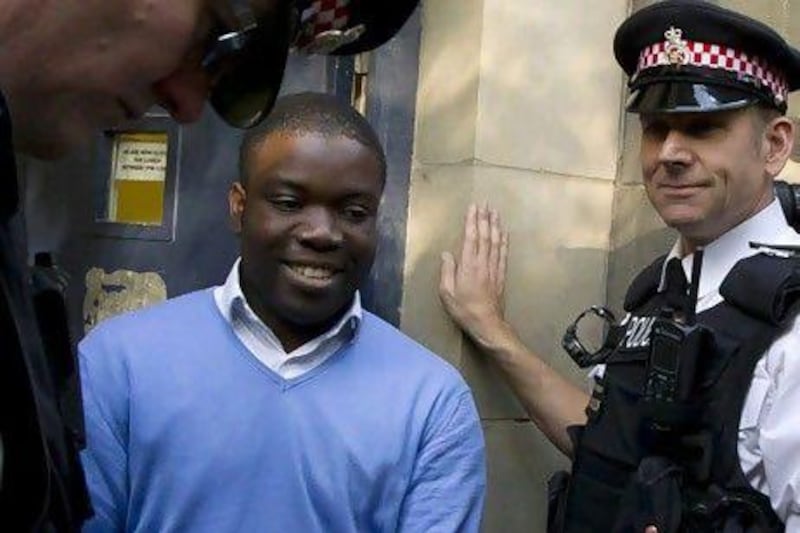What a thoroughly nice young man Kweku Adoboli seems, even in handcuffs.
The television coverage of the arrest of the 31-year-old Ghanaian charged with a fraud of US$2.3 billion (Dh8.44bn) at Swiss Bank UBS showed a smiling, cheerful soul, seemingly unaware of the furore breaking around him.
But I think that smile will come back to haunt him.
I've covered plenty of frauds and alleged frauds in my time, and there always seems to be one picture of the accused, looking smug and carefree. Maybe it's the way we, the media, select the images.
There was a similar one of Jerome Kerviel, who caused €4.9bn (Dh24.50bn) worth of damage at Société Générale a couple of years back; and there was famously one of Nick Leeson, the man who brought down Barings Bank in 1995 after running up losses of £850 million (Dh4.91bn).
Always that smile. It was beamed across the world on the pudgy face of Leeson as he was arrested at Frankfurt Airport en route from Singapore, the scene of his crime. Barings executives I knew at the time would have happily taken a hammer to the TV screen.
I was at The Sunday Times when Leeson was arrested, and it was probably the biggest single financial news event I've ever covered. For the next six months, my colleagues on the paper and I devoted many hundreds of hours to piecing together Leeson's crime. I got to know so much about him that I felt I knew him personally.
The face-to-face meeting had to wait until his release from Singapore's Changhi jail in 1999, where he had served three years. As I waited for him at a lunch table in one of London's poshest restaurants, I was expecting the same supercilious, inane grin on the waxy face I had seen in Frankfurt.
Instead, in walked a very serious, drawn-looking man with lines of deep suffering etched across his face. He was only 32 then, but looked a decade older.
He had not long been released, and was still feeling the after-effects of the treatment he underwent for stomach cancer while in prison. There was also the emotional pain caused by divorce from his beloved Lisa, which also befell him while in Changhi.
I had no particular reason to be friendly with him; he was a convicted criminal who had caused lots of suffering to hundreds of people, not all of it merely financial. The collapse of Barings had led to ruined lives, careers and retirements.
He had no great motive to be friendly with me either. The Sunday Times had pursued him and his family single-mindedly in the course of our reporting, and written approving leaders when the Singaporeans eventually threw the book at him. He got what he deserved, we thought then.
But over lunch I changed my mind. As he described his experiences in Singapore, I came to the conclusion that this man, whatever he had done, had suffered enough for his crime.
Just recently, Leeson apologised in public to former Barings executives for the pain they had endured as a result of the fraud, but I can tell you that he has been in a state of personal contrition in private for years. He certainly was that lunchtime.
We kept in touch for a quite a while after that. Nick (he had become "Nick" rather than "Leeson") went off to work for Galway City football club, in the part of Ireland my mother comes from, and married an Irish girl, Leona. He also played the after-dinner speaking circuit, talking inevitably about fraud, and whenever another story hit the headlines I would contact him for a view.
I last saw Nick in Dubai a couple of years back. He was in the emirate on a speaking engagement, and we had drinks on the terrace at the Jumeirah Beach Hotel, with Leona and their toddler. He was in good form, unrecognisable from the man I'd lunched with just a few years previously, and thinking positively about life again.
But he will be forever tainted and damaged by Barings. In the words of Fyodor Dostoyevsky: "If he has a conscience he will suffer for his mistake. That will be punishment, as well as the prison." That's the real price of fraud.





